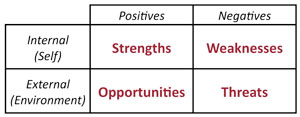Individual Opportunity Plan (IOP): Step 2 — Self Assessment: A Personal SWOT Analysis
|
To plan your career realistically it is essential that you assess your own abilities and evaluate the academic world around you. In this step of the IOP, you will use a common business tool, the SWOT analysis, to assess your personal (internal) Strengths and Weaknesses; and the Opportunities and Threats in your environment (external). This analysis will enable you to build on your strengths, address your weaknesses, exploit potential opportunities, and avoid any threats. Remember: the SWOT analysis will require honest self assessment. |
 |
Strengths
Strengths are activities or areas where you excel.
What skills do you do well? What are the strengths in your knowledge base? What positive behaviors or attributes do you exhibit?
List up to 5 strengths on your IOP worksheet: highlight strengths that are relevant to your career mission.
| Examples of Strengths: | ||
 |
Clinician: Highly competent general pediatrician Bilingual written and spoken language skills |
|
 |
Researcher: Graduate training on the biochemistry of the nervous system Developed mouse model for Alzheimer’s disease |
|
Weaknesses
Weaknesses are areas you want to develop or acquire.
What skills, behaviors or attributes do you wish to acquire or improve? What are the gaps in your knowledge? What resources or connections are you missing?
List up to 5 weaknesses on your IOP worksheet: highlight weaknesses that are relevant to your career mission.
| Examples of Weaknesses: | ||
 |
Clinician: Unsure how to engage underserved populations Need to understand population health issues |
|
 |
Researcher: Modest experience in grant-writing Unsure how to manage a lab efficiently |
|
Opportunities
Opportunities open new avenues for you to advance your career and mission.
Where is the growth opportunity for you? What is changing in your field? What funding opportunities are available? What are the gaps in knowledge?
Look for opportunities, openings, changes in your department, lab, school, community, nationally…
List up to 5 opportunities on your IOP worksheet that are relevant to your career mission.
| Examples of Opportunities: | ||
 |
Clinician: PCORI grants recently awarded to UMass Chan Faculty Preceptor needed for medical students in Free Clinic |
|
 |
Researcher: Call for applications on animal models from the Alzheimer Foundation Two graduate students are interested in the lab |
|
Threats
Threats may hinder you accomplishing your mission.
What threats (barriers, obstacles) are present or predicted in your department, the school or the external world that might hinder you accomplishing your mission? What are the political minefields? Changes in funding?
Have others in your department faced barriers or challenges to their progress?
Do your passions align with the expectations of your department or institution?
List up to 5 threats on your IOP worksheet that are relevant to your career mission.
| Examples of Threats: | ||
 |
Clinician: Overwhelming patient volume in clinical practice Limited staff resources |
|
 |
Researcher: Limited lab resources, particularly support for graduate students New Chair’s focus on neuromuscular disease |
|
Continue to Step 3 — Planning Your Career
IOP Navigation: IOP Worksheet | Overview | Step 1 | Step 3